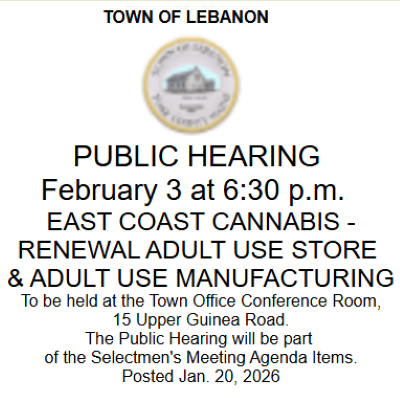CONCORD, N.H. - After an extended investigation that found 85 percent of a powerful oral opiate pain treatment being prescribed in New Hampshire was prescribed by a physician's assistant working out of PainCare of Somersworth and that the drug was often being prescribed improperly under questionable marketing practices, the maker of the drug has agreed to pay almost $3 million to the state as part of an agreement with the state Attorney General's office.
Attorney General Joseph A. Foster announced on Wednesday that his office had brought the enforcement action under the state's Consumer Protection Act against the makers of the powerful sublingual fentanyl spray product called Subsys. Insys Therapeutics, Inc., a Delaware corporation, is headquartered in Chandler, Arizona.
The company was found to have aggressively marketed its brand name opioid, Subsys, a sublingual fentanyl spray that, as an opioid pain medication. Subsys is classified as a Schedule II controlled substance.
In January 2012, the FDA approved Subsys for the management of breakthrough cancer pain in patients 18 years of age or older who are already receiving and who are tolerant to opioid therapy for their underlying persistent cancer pain.
In fact, New Hampshire patients received more than 800 Subsys prescriptions and more than 100,000 units of Subsys during 2013 and 2014, making New Hampshire patients the recipients of the second most prescriptions of Subsys per capita in the country.
The majority of the New Hampshire prescriptions were written by Christopher Clough, a physician assistant who was employed at PainCare, a pain clinic located in Somersworth.
During this period Clough became a frequent speaker within the Insys Speaker Bureau and was described by a former Insys official as a crucial part of the Insys Speaker Bureau. Clough was paid a total of $44,000 for speaking at approximately 40 programs on behalf of Insys as he quickly became the highest prescriber of Subsys in New Hampshire and one of the top Subsys prescribers in the country.
In a two-year span, Clough wrote more than 760 Subsys prescriptions, representing 84 percent of the Subsys prescriptions written in New Hampshire.
The Attorney General's investigation concluded that many of these speaking engagements were a scheme by Insys to provide payments to induce prescribers to write Subsys prescriptions. Some of these speaking programs did not include anyone who could actually prescribe the drug and were sham events that were mostly social gatherings at high-end restaurants attended by Clough's friends and members of the office staff at PainCare, according to an Attorney General's Office press release.
In 2014, the New Hampshire Board of Medicine brought a disciplinary action against Clough for his inappropriate prescribing practices. In 2015, the Board of Medicine banned Clough from managing chronic pain, prescribing Schedule II-IV drugs, and performing pain procedures. In December, 2016, the Board revoked Clough's license to work as a physician assistant.
Unlike other opioid manufacturers being investigated by the Attorney General, Insys Therapeutics was cooperative in producing documents in response to the Attorney General's subpoena and otherwise cooperated with the State's investigation. While disputing and not admitting any of the alleged facts put forth as a result of the Attorney General's investigation, the drug company has agreed to the terms of an Assurance of Discontinuance under the Consumer Protection Act to resolve the matter.
On January 18, 2016, the Attorney General accepted the terms of the Assurance of Discontinuance, the terms of which include: - Insys shall not make any written or oral claim in the promotion, marketing, sale or distribution of Subsys that is false, misleading, or deceptive. - Insys shall not make any written or oral promotional claim for Subsys that violates the FDA Act or regulation. - Insys shall comply with written policies designed to ensure the Subsys speaker program conforms to appropriate standards, including a cap on the number of speaking events for any one speaker and a cap on the payments that a speaker can receive in a year.
Under the Assurance, Insys has paid the State of New Hampshire $2,900,000 for its collective violations of the Consumer Protection Act. Insys will also make a direct payment to the New Hampshire Charitable Foundation in the amount of $500,000, to be used for the purpose of preventing or remediating problems related to abuse, misuse, or misprescribing of opioid drugs in New Hampshire. "This settlement represents an important first step in our investigation of the marketing practices of opioid manufacturers, Foster said. "Understating or misrepresenting the addictive nature of opioids can and has led to addiction and, in far too many cases, overdose deaths in our state. It is important for this investigation to continue into the conduct of other opioid makers to assure that false and deceptive marketing practices have or will be stopped."
It should be noted PainCare was not listed as a culpable party in the assurance agreement.
Meanwhile, given both the amount, strength, and nature of the Subsys prescriptions that were written by Clough while he was employed at PainCare, Attorney General Foster issued an alert that calls on individuals who possess Subsys prescriptions that were prescribed by be aware that such prescriptions may have been issued for conditions in which Subsys is contraindicated; posing a risk to those who use it.
Subsys is a fentanyl spray that is significantly more potent than morphine and heroin. The FDA's approved use of Subsys is for the management of breakthrough cancer pain in adults who are already receiving, and who are tolerant to, around-the-clock opioid therapy for their underlying persistent cancer pain.
Individuals in possession of Subsys who have questions as to whether or not it is appropriate and/or safe for them to use the drug, should contact their medical care provider before any further use of the drug.
Individuals who wish to safely dispose of a filled Subsys prescription should bring it to a local police station that contains a Prescription Drug Drop Box.














